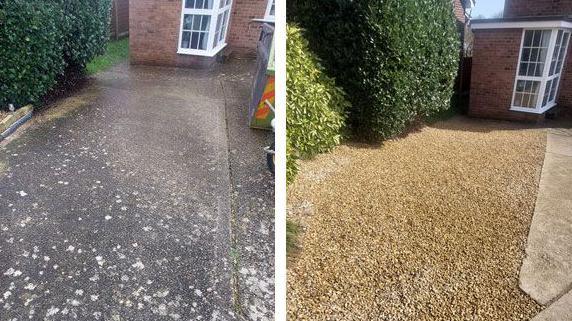Why people are being paid to use gravel on their drives

Concrete drives have been replaced by permeable ones to allow rainwater to soak away
- Published
Homeowners in an Isle of Wight village are being paid to replace driveways in a bid to reduce the likelihood of flooding.
Southern Water is encouraging the use of permeable alternatives such as gravel and cobblestones to prevent rainwater from deluging the drainage system.
Residents of Binstead near Ryde are being offered £75 per square metre to replace impermeable paved and concrete driveways and yards.
Southern Water said it planned to use data gathered from the scheme to inform a wider roll-out across the south east of England.
Binstead was chosen for the de-paving pilot scheme as it has experienced a number of flooding events in recent years.
Permeable surfaces slow the flow of rain by allowing it to gradually be absorbed into the ground instead of running straight into drains and the combined sewer network, where it joins with wastewater.
'Slow the flow'
The scheme is also intended to reduce reliance on storm overflows - the local overflow at Binstead is used up to 20 times a year to prevent further flooding of homes and businesses when sewers have become overloaded with surface water.
It is estimated 10mm of rain falling on the area, in one downpour, would create nearly 2.5 tonnes of surface water, which would run into the sewer network.
Southern Water engineer Harry Buckingham said: "The increase in paved gardens and driveways in the UK makes flooding more likely and contributes to storm overflows being activated.
"We are committed to reducing overflows and helping customers to slow the flow of water entering the system through measures including water butts, soakaways and permeable driveways."
Follow BBC South on Facebook, external, Twitter, external, or Instagram, external. Send your story ideas to south.newsonline@bbc.co.uk, external.